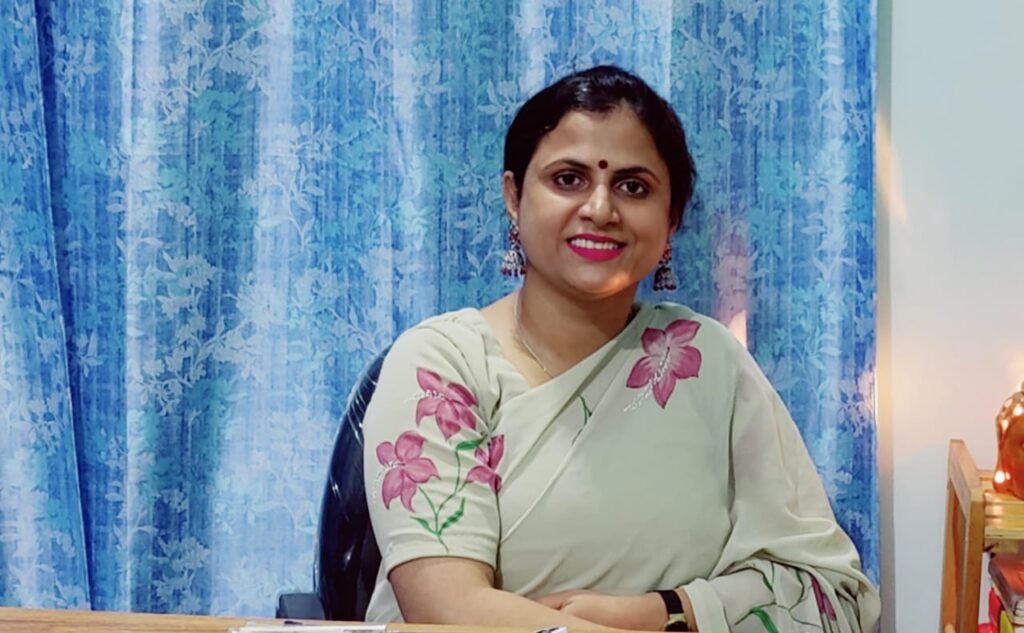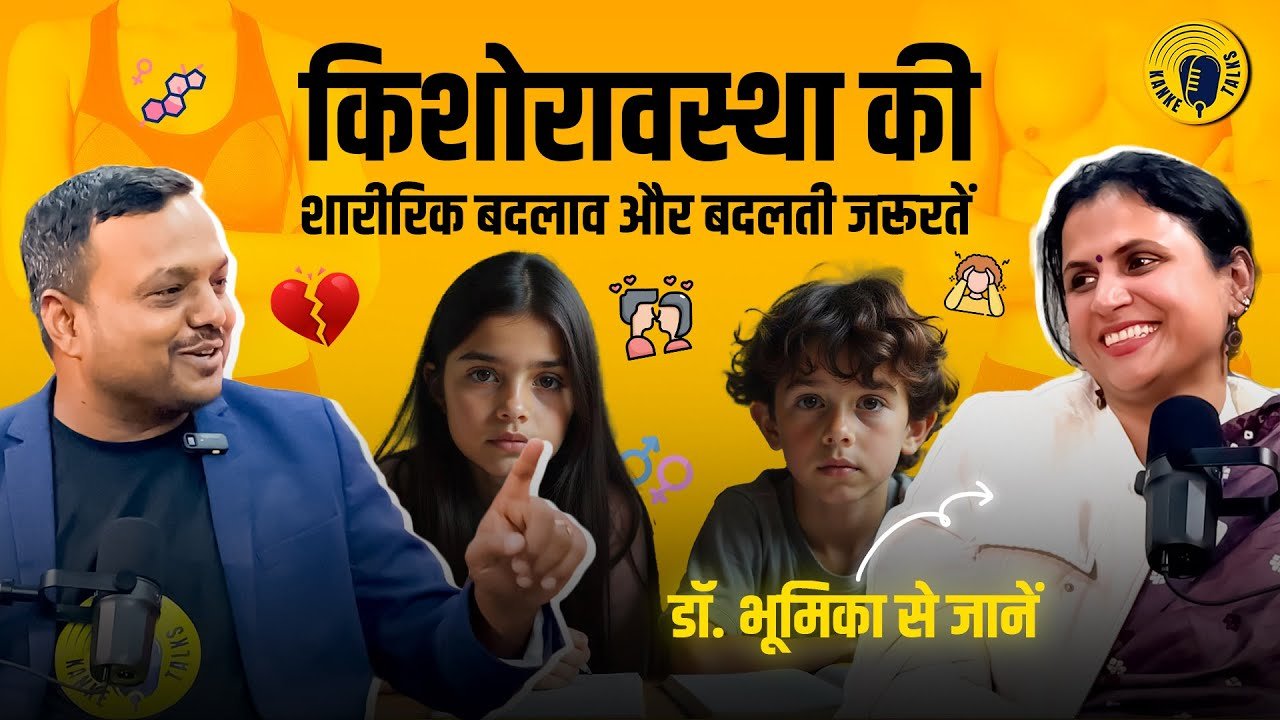Because every story deserves to be told.
In a time when reels educate faster than reality, and teenage hearts beat to the rhythm of algorithmic trends, a quiet crisis is unfolding. It’s not just about screen time. It’s about soul time.
Meet Dr. Bhoomika Sachchar, a clinical psychologist, counselor, and the much-needed voice in this whirlwind of mental, emotional, and digital chaos. Her journey is not just one of degrees and diagnoses—it’s about decoding teenage turmoil in a world that’s moving faster than understanding can catch up.
And through her candid conversation on “Kanke Talks,” we don’t just get answers—we confront questions that every teenager, every parent, and every teacher must hear.

Teenage: The Age of Accelerated Emotions
Dr. Bhoomika begins by addressing what she calls “the fast-forward generation.” Today’s teenagers, she explains, are growing up before they even understand what it means to grow. From 10 or 11 years old, kids now exhibit adolescent behavior that used to emerge around 14 or 15.
What’s the culprit? Social media.
“Children are learning in minutes what used to take us years to understand,” she says. “They’re told they can increase concentration through a reel. One minute of content is becoming a replacement for real experiences.”
The downside? They’re losing patience, depth, and emotional intelligence.
Love, Lust & Likes: Understanding Teenage Intimacy
In a world where the term “love” is just a DM away, Bhoomika draws an important distinction: attraction is not always love. Teenagers don’t often understand this. A six-month relationship might feel like forever, but it rarely is.
And then comes the real danger: sharing personal images, emotional dependency, and getting into physical relationships far too soon.
“The biggest damage is emotional,” Bhoomika says. “You don’t even know the person properly. You’re not emotionally mature. This often leads to heartbreak, loss of self-esteem, and even depression.”
So, what’s the solution? Open communication.
“Talk to your children,” she urges parents. “Not with fear, not with punishment—but with empathy.”
The Parent Trap: Communication Gaps That Hurt
A large part of the problem, Dr. Bhoomika notes, lies at home.
Parents are either too lenient or too controlling. Both extremes harm the child.
Today’s parents are busy on their phones while complaining about their children’s phone addiction. They want their child to open up, but they shut down uncomfortable topics like intimacy, attraction, and emotion.
“After age 10, kids go through emotional, physical, and sexual changes,” Bhoomika explains. “If you don’t talk to them about it, their friends or YouTube will. And not everything they hear will be true.”
The danger of half-baked knowledge is real. Children end up turning to peers for advice that should come from adults.
Toxic Relationships and Teen Suicides
One of the most heartbreaking trends Bhoomika addresses is suicide due to toxic relationships. It’s not sudden, she says. It always comes with signs—withdrawal, irritability, overuse of phones, even self-harming behavior.
“If your child suddenly says they want to die, don’t brush it off as drama,” she insists. “Take them seriously. These are cries for help, not manipulation.”
Many children hurt themselves not because they want to die but because they want to numb emotional pain. They need attention, care, and counseling—not criticism.
Schools, Society & Pressure Cookers
The academic pressure cooker is another monster teens wrestle with. Parents want 100/100 marks, admission to IITs and AIIMS, and trophies to show off on social media.
Dr. Bhoomika points out the damage: “Not every child is meant for science or engineering. Some are artists. Some are journalists. Some thrive in sports or communication. We are killing individuality in the name of parental pride.”
She adds that performance doesn’t always reflect potential. “We are sitting on these chairs not because of our marks, but because of our life skills.”
Boundaries, Friendships & Identity
Bhoomika dives into the concept of personal space. Teenagers often don’t know how to set healthy boundaries—with friends, with boyfriends/girlfriends, or even with family.
Every relationship—be it family, friendship, or romantic—needs space and individuality. “You don’t become one person after falling in love. You’re still you. Your decisions, values, and priorities matter,” she says.
And with friendships, especially, she warns: not all friends are forever, and not all friends are safe. “Learn to identify emotional manipulation—even in your best friend,” she says.

Online Dangers: The Reality of Social Media
Social media has both beauty and brutality. It teaches, but it also traps.
It connects, but it also compares.
Dr. Bhoomika warns of the growing obsession with external validation—especially through likes, comments, and shares. “If a photo gets 2 likes, the child feels ugly. If it gets 80 likes, they feel validated. That’s dangerous,” she warns.
She advocates for building inner self-esteem through family support, praise, and healthy comparisons—“not comments like, ‘look at your brother’s handwriting!’”
What About Bullying?
Bullying in school based on appearance, marks, or speech issues is rising. Parents often overreact or underreact.
Dr. Bhoomika suggests: “Teach your child to laugh off minor jibes. Turn bullying into a badge of humor, not shame. Build their resilience.”
Marriage, Commitment u0026amp; Infidelity
Bhoomika doesn’t shy away from discussing adult topics like marriage and extramarital affairs.
She says relationships fail when communication fades and expectations rise. “Romance doesn’t end with marriage,” she smiles. “Even sharing a meal or watching TV together is intimacy.”
On infidelity, she’s blunt. “Yes, even happy marriages can have affairs. But that ‘happiness’ is often a show. Inside, something’s missing—communication, attention, respect.”
She encourages couples to revive their connection, talk more, and invest in small gestures. A flower, a compliment, or just listening can go a long way.
Why Counseling Matters
Dr. Bhoomika emphasizes the importance of counseling—not just for the troubled child but for parents too.
She explains impulse issues—risky behavior like reckless driving or early intimacy—is a sign that children need emotional channeling. “Not every child needs medicine. But every child needs understanding.”
Even professional boundaries at work—among colleagues, bosses, or juniors—must be taught. “Respect begins where interference ends,” she reminds.
Bhoomika’s Own Story
Born in Ludhiana, Bhoomika was raised in UP by a maths teacher father and a fair, firm mother. “I hated maths,” she laughs. “But I stood up for my interests. I chose Arts when everyone else chose Science.”
That confidence has shaped her counseling today—teaching teens that saying ‘no’ to pressure is powerful.
She talks openly about crushes, attraction, emotional confessions—all part of her teen years. “I understood my feelings. But I also understood my limits. That’s the difference.”
Final Advice: For Teens & Parents
To Teens:
- Don’t mistake attraction for love.
- Set boundaries in every relationship.
- Love your individuality—don’t lose yourself to please someone.
- Rejection is not the end. It’s redirection.
- Your parents might not always understand—but they will always care.
To Parents:
- Don’t punish curiosity—guide it.
- Talk more, scold less.
- Validate your child’s emotions before correcting their behavior.
- Your child’s marks don’t define them. Their mindset does.
- Be their safe space, not their fear zone.

No responses yet